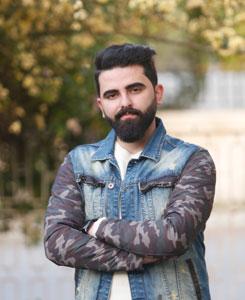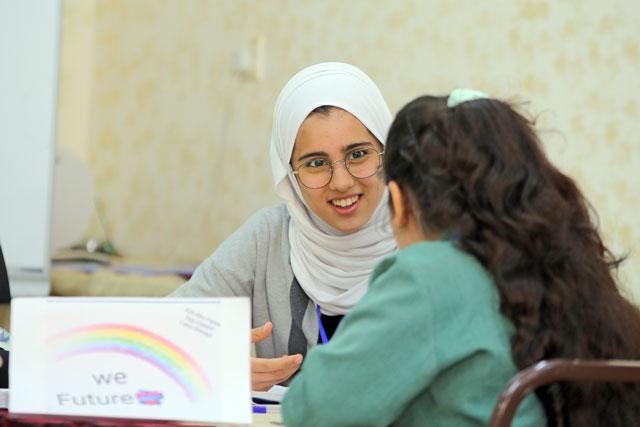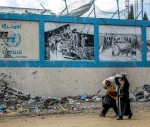You are here
EU, UNESCO raise media and information literacy awareness
Jun 24,2019 - Last updated at Jun 24,2019

Hamza Al Hassan
AMMAN — Hamza Al Hassan, 26, a graduate of the Yarmouk University’s Faculty of Mass Communications feels that there is room for media and information literacy (MIL) improvement in Jordan.
Hassan was first introduced to the concepts of MIL under the EU-funded and UNESCO implemented “Support to Media in Jordan” project during a MIL “training of trainers” session he attended.
Finally, he felt like he was gaining the skills to confront what he had been noticing around him since 2013. “In Mafraq, everyone started using Facebook as their main source of news and means of communication. This led to a lot of issues including the spread of hate speech and cybercrime. People believed random things written on Facebook as if these had been written in stone,” he said.
Hassan knew he wanted to be part of the solution and continued to educate himself. In 2018, the EU-funded and UNESCO implemented “Youth Empowerment” project began in Jordan.
The project represents a timely response to promoting the safe and ethical use of media and the Internet to advance MIL skills as a holistic response to fostering informed use, consumption and production of media and Internet among youth.
Currently, alongside key partners, UNESCO is conducting MIL mentorship training for youth civil society organisations (CSOs) to raise awareness of disinformation in the communities of Mafraq and Zarqa. Hassan has joined the EU/UNESCO training as a mentee and is excited to continue to sharpen his competences.
Under this part of the “Youth Empowerment” project, two youth organisations have been selected: “Drabzeen for Human Development” and the “I Learn” initiative. UNESCO and partners are providing mentorship to young volunteers and staff from these organisations, with the goal of equipping them with the MIL teaching skills to later conduct the MIL training themselves, continuing to raise country-wide MIL awareness.
“Drabzeen” carries out its work dynamically, with a focus that ranges from promoting good governance and human rights to working towards supporting the rehabilitation of the Jordanian labour market; to implementing a group of initiatives to support the rule of law and media and technology in development, health and environment, and fundraising for small economic projects. Hassan began to volunteer with “Drabzeen” a few years ago, intrigued by their focus on media education.
UNESCO believes that MIL supports the development of inclusive knowledge societies, encouraging the active engagement of youth through information and communication technologies, drawing on relevant quality content, based on human rights and dignity.
Strengthening MIL skills falls within UNESCO’s mandate of encouraging freedom of expression and access to information. The objectives of the “Youth Empowerment” project align with the 2030 Agenda for Sustainable Development, specifically targeting Sustainable Development Goal 16, which strives to promote just, peaceful and inclusive societies. This initiative is being carried out in partnership with the EU, the minister of state for media affairs, the Ministry of Education, the media community and CSOs in Jordan.
Hassan is no longer easily fooled by items that might prove to be “fake news” and is proud to be helping friends and family to validate stories they might be curious about.
“It is really quite incredible what people are willing to believe. Once at university, a rumour went around Facebook that a professor was giving out extra grades as a gift on Independence Day. Of course it wasn’t true but everyone believed this!”
More and more, Hassan is growing weary of social media. “In Jordan, I feel social media has become a public forum for criticism. People of all ages here have taken to Facebook to air their issues. It has become so depressing that I cannot even bring myself to open it sometimes,” he said.
In the future, Hassan hopes to pursue a career as a media education trainer as he seeks to spread MIL best practices throughout the Kingdom. He feels strongly that women are most worthy of investment when it comes to MIL training.
“Women care about the message and readily pass on what they learn about MIL to their friends, families and kids. They do not come to training for an allowance or just to socialise. They come to learn and they cascade what they learn to a bigger group”.
(UNESCO contributed this article to The Jordan Times)
Related Articles
AMMAN — The UNESCO Amman office has recently launched a media training programme for youth, according to a joint statement sent to The Jorda
AMMAN — Students at Sukaina Bint Al Hussein Secondary School in Zarqa are passionate about media and information literacy (MIL).
AMMAN — Minister of Culture Bassem Tweissi on Thursday reiterated the Kingdom’s commitment to boosting Media Information Literacy (MIL) amon
















